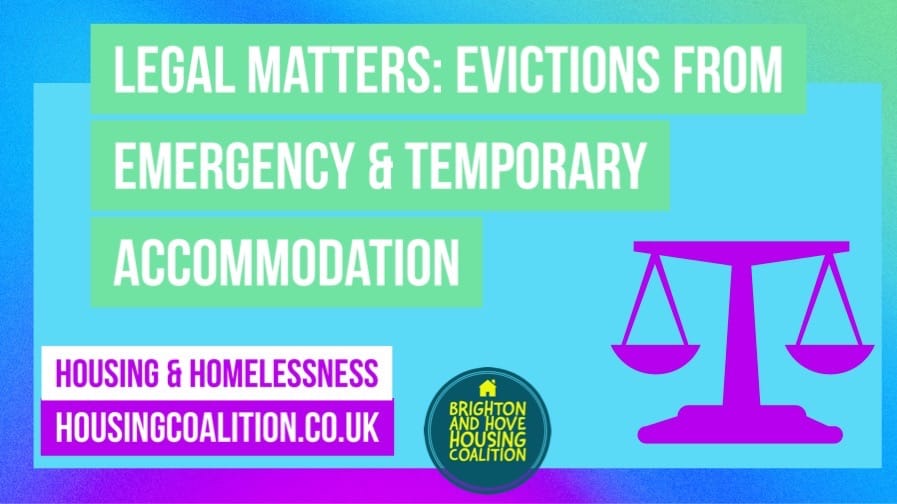Evictions from Emergency/Temporary Accommodation
Introduction
In Brighton & Hove, much of the emergency/temporary accommodation is owned by private companies, who frequently impose very stringent conditions on their occupiers.
I have recently seen an example of the licence agreement and terms provided to a new resident of Kendal Court (let’s call him Rob). The council had accepted a duty to provide him with interim accommodation under section 188 of the Housing Act 1996 (see below; where I refer to section numbers I mean this Act. I shall also refer to the statutory Homelessness Code of Guidance for Local Authorities as “the Code”). The licence could be terminated at a moment’s notice; it was expressed to be “nightly”. The terms were stringent (although not as bad as in some other accommodation – visitors were allowed during the day) and leave lots of room for interpretation (it is a breach to take part in conduct which “may annoy your neighbours” – clause 2). There was a prominent notice on the documents:
If you are asked to leave this accommodation as a result of any breach of this license agreement then the council may decide that the duty or power to provide you with accommodation has ceased and you will not be provided with alternative accommodation.
In other words, if the owner of Kendal Court decides Rob has breached the agreement, the council may decide not to give him anywhere else.
I am informed that this often happens; that people who are evicted from these properties are often simply told that’s it. I am also told that a significant proportion of those sleeping rough have had this experience and the council will not accept any further application from them.
Emergency and Temporary Accommodation
These are local authority terms, not legal ones. Broadly, emergency accommodation is what the local authority has available to accommodate persons when they first accept a duty to them, on short or no notice. All accommodation provided under Part VII of the Housing Act 1996 (i.e. by the homeless persons’ unit) must be suitable, but this requirement is not so stringent for accommodation which is only for a few days or a week or so. Temporary accommodation is for the longer term and should be of a higher standard.
The Law
The law does not use these terms. Instead, there is the section 188(1) duty to provide interim accommodation and the section 193 duty (“the full duty”) to secure accommodation for as long as necessary, before a further move to permanent accommodation – in Brighton & Hove, through the allocation scheme, Homemove.
The duty to provide interim accommodation
When a person applies as homeless, the first decision the council must make is whether that person maybe homeless, eligible (this relates to immigration status) and vulnerable. If they are, then the council must provide them immediately with interim accommodation (section 188(1)). That obligation lasts until a final decision is made on their application; the final decision may or may not be to accept the full duty and provide them with section 193 accommodation (full details are in the Code, paras 15.7-15.12).
Rob was given interim accommodation under section 188(1). There is absolutely nothing in the legislation or the Code that allows a local authority to discharge its duty towards Rob before they reach their final decision under section 193 etc. If the owner of Kendal Court wants him out, the council must provide him with alternative suitable accommodation, unless and until they reach a final decision on what duty they owe him.
It is possible that the High Court might, if Rob’s behaviour made it very hard to go on accommodating him, be prepared to say that the Council had done all it reasonably could to discharge its duty under section 188(1); but I do not know of any case where that has happened. Even the duty was discharged in this way, the Council would still have to go ahead and make a decision on his homelessness application, and would not be permitted to take his eviction from interim accommodation into account (because it took place after the application – Din v Wandsworth LBC, [1983] 1 AC 657, HL).
The Homelessness Reduction Act 2017
This Act does not affect the basic position. It simply says that while Rob is in interim accommodation he is owed the relief duty, under which the local authority must help him find alternative accommodation for 56 days.
The full duty to provide accommodation (section 193)
Once the final decision letter has arrived, if Rob remains in temporary/emergency accommodation, the position changes; there is a way that the Council can discharge its duty as a result of his conduct. Under section 193(6)(b) (Code 15.42(b)), the duty is ended if he becomes homeless intentionally from the accommodation provided. However, the duty may still only be brought to an end by a formal decision letter, giving Rob 21 days to request a review, and the Council must prove that the accommodation was suitable in the first place and that Rob’s act is the true cause of the eviction. Moreover the duty may not be ended instantly; besides the chance to review Rob is also entitled to reasonable notice.
Advice to Rob
If Rob fell out with the caretaker at Kendal Court and found his right to stay terminated, he should go to Bartholomew Square and ask for alternative accommodation. If the council refuses, he should, as always, insist on this decision being given to him in writing; and he should take this to solicitors so that they can bring judicial review proceedings to require the council to carry out its duties.
By David Thomas Legal Officer BHHC
Whatever your legal matters around housing, Brighton and Hove Housing Coalition and building on your experiences to bring you some practical legal advice free from our website. Check out our Legal Matters page here for more info.
The Coalition often post exclusive content and useful articles on our Facebook Group and Page. You can also get in touch with us via email if you have a legal issue around housing and homelessness you want us to know about. Become a Member of the Coalition and help up unite housing activists and groups to help change a broken housing system.
We are a non statutory funded community and resident run organisation, we rely on the generosity of the public and grants from non statutory run organisations like Brighton and hove city council. If you can donate, however big or small to the coalition then you will be helping us to continue holding the housing establishment to account. Donate here

